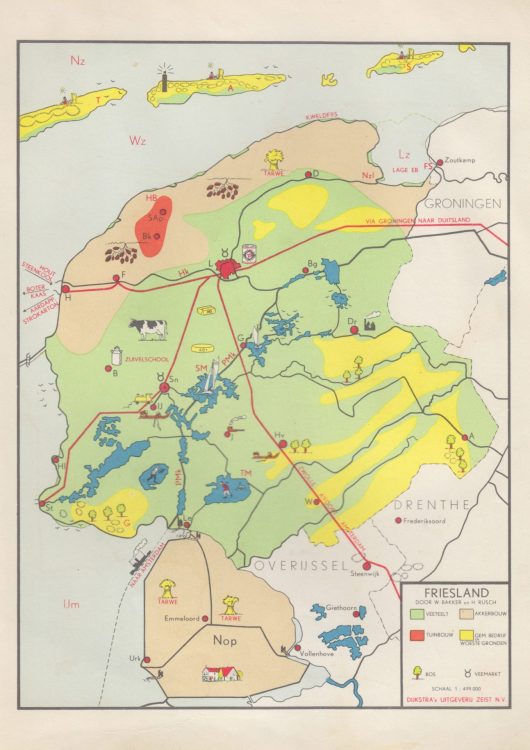From May 1st until the 30th of June the artists Honey Jones-Hughes and Antonio de la Hera are temporary residents of Friesland. During their two month stay in our VHDG Lokaal, Honey and Antonio continue their long-running research on the agricultural sector in the Netherlands. In the region of Friesland, they will look at the various scales of agricultural businesses, how farmers approach sustainability and the role that machines play in the farming business. Why do farmers make the decisions they make? If they decide on one thing, do they exclude something else? And who bears the cost? In short: ‘What is ‘Best Practice’?
A new chapter: Friesland The 1st of May Honey and Antonio will start this new chapter of their artistic research in Friesland. The first period consists mainly of ‘embedded practice’ (research by means of collaborating with different communities), and the mapping of the local agricultural sector by visiting farmers and businesses. From June 3rd until June 25th the research will be moving step by step into Kunstruimte H47: an art space that you can enter as a visitor, get to know Honey and Antonio’s ongoing research and discover the various Best Practices of the farmers in Friesland together with us. As Honey and Antonio’s journey progresses we will reveal more about what exactly will happen in the space.
During this residency, Honey and Antonio will also collaborate with VHDG on a pilot project: workshops for MBO-students from the Aeres MBO college in Leeuwarden. As a part of the course ‘citizenship’ Honey and Antonio will visit several locations with Life Sciences students, which will also form part of the artistic research of the artist duo.
‘Best Practice’
In Friesland, Honey and Antonio focus on how striving for ‘Best Practice’ has influenced the land and the work of farmers. Are there differing views on what Best Practice is, and if so, what are they? How big or small does an agricultural enterprise need to be? What external requirements and restrictions does a farmer have to meet, and still cover internal costs? How can farmers make their business more holistically sustainable, and what effects do these changes have on the efficiency of the production process?
Since the 1950s, on average fourteen farmers have decided to stop farming every day in the Netherlands, while the overall production has increased. Why is the agricultural sector moving in this direction? How did producers change their practices in order to be able to earn a living? Honey and Antonio’s research points to the introduction of the machine as playing a key role, enabling farmers to scale-up. But these machines are far from cheap, and the expense is often too great for small farmers. Because of this, the machine makes a fitting symbol for the various aspects involved in ‘Best Practice’.
The rise of the machines
The implementation of machines into agriculture has allowed farmers to optimize production, relieve people from a range of routine tasks, doing otherwise dangerous labor in a safe manner and improving the total returns. Farmers can operate on a much larger scale, in less time and with less laborers.
But while initially the practice of the agricultural businesses shaped the ways in which machines were used, nowadays the machines are dictating the methods and structure of the production process. The industrialization, together with the pressure to produce maximum outputs, has drastically changed the views regarding what ‘Best Practice’ is supposed to be, in a sector that is being scrutinized globally.
100% fair
Since 2020, Honey and Antonio have been working together on projects that address socio-economic problems that they experience in their own daily lives. How do we, as a society, deal with issues like sustainability and environment? And how do human-made structures, like the market economy, influence these things? With their project BUURTIJS (2020-2022) they mapped the agricultural industry around Rotterdam with the goal to produce a 100% fair, local ice cream. They visited farmers, producers and gardeners by bicycle to learn about the challenges and dilemmas they face on a daily basis
Honey and Antonio collected ingredients which they used to produce ice cream themselves. They sold it in various small-scale places in exchange for a solidarity payment: as a visitor you did not pay for the product itself, but for the work done producing it. Visitors were also informed about the journey each ingredient had made. The project raised questions about sustainability and (in)dependence of the farming businesses on a biking distance from their home. What choices do farmers make concerning sustainability and environment? What financial challenges, restrictions and opportunities do they encounter? And how does this all form their daily work practice?
Follow the research by Honey and Antonio in Friesland through our website and socials for updates on the progress made, and visit Kunstruimte H47 between the 3rd and 25th of June to personally dive into the artistic journey by Honey and Antonio. Engage in conversation with the artists, share your ideas about ‘Best Practice’ and learn, together with us, about the art of a farmers’ existence in Friesland.
Image from the research archive by the artists: a page from "Ons Eigen Land" by W. Bakker en H. Rusch, 1963, Zeist Dijkstra Verlag.
Supported by: Mondriaan Fonds, Gemeente Leeuwarden, Provincie Fryslan, Prins Bernhard Cultuurfonds, Fonds 21, Aeres MBO Leeuwarden
